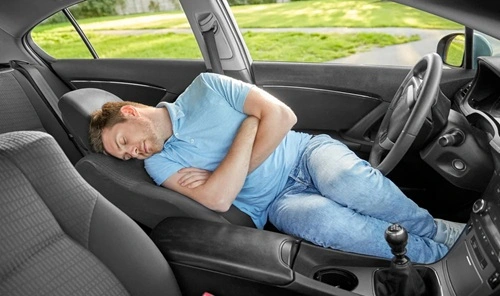Well, it is not technically illegal to sleep in your car all across the United States. But there sure are some rules regarding that which you should not avoid or overlook, if you do, you’ll be liable to some legal action against you or you’ll have to pay a fine. But, let’s say you’re still a bit unclear about it, then just keep on reading to know a little more.
States That Don’t Allow It (Or Make It Difficult)

Sure enough, as you must have experienced yourself, some states are surely super strict about it. Here are some examples related to that:
- Florida: In the Florida Keys area, your public sleeping arrangement in a car is illegal. You will be asked to move along or may be subjected to a fine.
- Virginia: Highway rest stops cannot be used as sleeping stations here. Some cities can even issue you a fine just for nodding off in your vehicle.
- Tennessee: Some of the municipal cities forbid the practice of car sleeping altogether on private property unless permission is granted by the landowner.
- New Jersey: It is not clearly defined, but if you are in the driver’s seat and drink under the influence of alcohol, even though the engine is off, you may be considered for drunk driving charges.
States That Are More Relaxed About It
There are some other states in the country that perfectly allow sleeping in your car, and some with a few rules here and there. Like:
- California: At official rest areas, you can stay in your vehicle for up to 8 hours. Parking in residential areas or near businesses is typically considered illegal, so just be aware of that.
- Texas: Rest stops allow a stay of 24 hours. Still, there might be local rules, so it is best to double-check.
- Nevada, Idaho, and Wyoming: Pretty chill in general. As long as you are not on private property without permission or ignoring a “no overnight parking” sign, you should be all set.
Where Can You Actually Park and Sleep Without Issues?
To avoid getting a knock on the window from a police officer, stick to these safer spots:
- Rest Area on Highway: Most rest areas let you stay for a few hours, and you should always check for posted rules just to be in the clear and right side of the law.
- Walmart Parking Lots: Well, not some, but most of them allow overnight parking, but it is best to ask the manager first.
- Truck Stops and 24-Hour Gyms: Great for passing travelers.
- Campgrounds: If you can find free campgrounds, that can be better, but usually the paid ones are super cheap too, and you can rest longer there.
- Public Lands (like BLM or National Forests): Often ok, but look for signs and check local laws before parking.
Just to be a lot clearer here, you see, we’d say that you should make sure that you know downtown streets, city suburbs, and school districts should be avoided when parking a vehicle. These places usually prohibit overnight parking, and the local residents may call law enforcement if a car seems out of line.
What Can Happen If You Park in the Wrong Place?
Well, this is what you might end up facing:
- Tickets or Fines:Usually varying from $100 and $300, depending on the local laws.
- Trespassing Charge: If you trespass on private property without even asking the permission first, that’ll land you in big legal trouble.
- DUI Charge:If you are intoxicated, in the driver’s seat, and have keys on you, even if you are not driving.
Police might simply instruct you to move your car. But they can even tow it away in certain instances, more so if you are not there when they arrive.